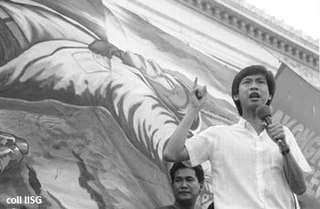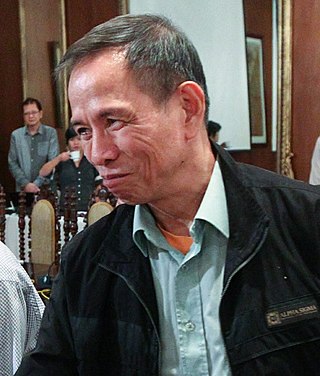
The Communist Party of the Philippines is a far-left, Marxist–Leninist–Maoist revolutionary organization and communist party in the Philippines, formed by Jose Maria Sison on 26 December 1968. It is designated as a terrorist group by the United States Department of State together with Sison and its armed wing New People's Army (NPA) in 2002. The European Union renewed its terrorist designation on the organization in 2019, though a 2009 ruling by the EU's second highest court delisted Sison as a "person supporting terrorism" and reversed a decision by member governments to freeze assets. According to the US' Central Intelligence Agency (CIA) World Factbook, the CPP and the NPA aims to destabilize the Philippines' economy and overthrow the national government.

Jose Maria Canlas Sison, also known as Joma, was a Filipino writer, poet, and activist who founded and led the Communist Party of the Philippines (CPP) and added elements of Maoism to its philosophy—which would be known as National Democracy. His ideology was formed by applying Marxism–Leninism–Maoism to the history and circumstances of the Philippines.

Filemon Castelar Lagman, popularly known as Ka Popoy, was a revolutionary socialist and workers' leader in the Philippines. He shares the ideology of Marxism-Leninism. He split with the Communist Party of the Philippines in 1991 to form Bukluran ng Manggagawang Pilipino (BMP) and the multi-sectoral group Sanlakas.
The First Quarter Storm, often shortened into the acronym FQS, was a period of civil unrest in the Philippines which took place during the "first quarter of the year 1970". It included a series of demonstrations, protests, and marches against the administration of President Ferdinand Marcos, mostly organized by students and supported by workers, peasants, and members of the urban poor, from January 26 to March 17, 1970. Protesters at these events raised issues related to social problems, authoritarianism, alleged election fraud, and corruption at the hand of Marcos.

Leandro "Lean" Legara Alejandro was a student leader and left-wing nationalist political activist in the Philippines.
Makabayang Koalisyon ng Mamamayan is a coalition of twelve party-lists in the House of Representatives of the Philippines. It was founded on April 16, 2009. The founding assembly was held at UP Theatre, Diliman, Quezon City.
National Democracy (ND), known colloquially as natdem, is a political ideology and movement in the Philippines that aims to establish a people's democracy in the country. With the Communist Party of the Philippines as the vanguard party, the movement seeks to address what it deems to be the "root causes of social injustices affecting the Filipino masses" in what is analyzed to be a "semi-colonial and semi-feudal society", by confronting the "three fundamental problems" of imperialism, feudalism, and "bureaucrat capitalism".

Maria Lorena Morelos Barros was a Filipino activist. She founded the Malayang Kilusan ng Bagong Kababaihan or MAKIBAKA, a militant women's organization shortly before the Martial Law. When Martial Law was declared, she went underground, was later captured and was a top political prisoner. She escaped to the countryside as a guerrilla fighter and was killed during a military ambush at 28 years old.

Malayang Pagkakaisa ng Kabataang Pilipino, abbreviated MPKP was a youth organization in the Philippines. It was the youth and student wing of the pro-Soviet Partido Komunista ng Pilipinas-1930 (PKP). The MPKP was founded on November 30, 1967, as the PKP broke its links with the Kabataang Makabayan. Whilst the KM developed a Maoist orientation under the leadership of Jose Maria Sison, the MPKP argued that protracted revolutionary war was not feasible considering the geography of the Philippines. Some six hundred delegates took part in the founding congress of the MPKP, held in Cabiao, Nueva Ecija. The leading group of the MPKP had belonged to the KM in Central Luzon. Francisco Nemenzo Jr. was amongst the founders of the MPKP. As of 1970, the MPKP was estimated to have some 5,000 members, predominantly young peasants and rural workers. The MPKP published Struggle as its organ.
Student activism in the Philippines from 1965 to 1972 played a key role in the events which led to Ferdinand Marcos' declaration of Martial Law in 1972, and the Marcos regime's eventual downfall during the events of the People Power Revolution of 1986.
The First Great Rectification Movement refers to a 1965 ideological movement by Filipino communists led by Jose Maria Sison wherein they "criticized, repudiated and rectified the major ideological, political and organizational errors and weaknesses" of the 1930s-era Communist Party of the Philippines. This rectification movement led to the reestablishment of the Communist Party of the Philippines on December 26, 1968 along Marxist–Leninist–Maoist Thought.

Benito Tiamzon was a Filipino political organizer and until his arrest in March 2014 by Philippine security forces, was believed to be the Chairman of the Communist Party of the Philippines (CPP) and its armed wing, the New People's Army (NPA).

Kabataang Makabayan, also known by the acronym KM, is an underground communist youth organization in the Philippines which was active from 1964 to 1975. It was banned by the Philippine government in 1972 when then-President Ferdinand Marcos declared martial law, and was driven underground. It was dissolved in 1975 along with other National Democratic mass organizations, as part of the National Democratic movement's change of strategy against the Marcos regime. Revived within the Manila-Rizal area in 1977 and later nationally in 1984, the organization continues to exist.
Antonio De Leon Zumel II, also known by his nicknames Tony, Manong, Ching and Antumel, was a Filipino journalist, activist, and ;eftist revolutionary. He was two-time President of the National Press Club of the Philippines before going underground in 1972 at the start of the Marcos dictatorship. In 1990, he was elected Chairperson of the National Democratic Front of the Philippines in absentia, and was a senior adviser to the NDFP negotiating panel from 1994 until his death in 2001.
Anakbayan is an international militant youth organization espousing Marxism–Leninism–Maoism and National Democracy based in the Philippines. It is part of the broader Bagong Alyansang Makabayan, a left-wing alliance in the Philippines.
Philippine Society and Revolution, first published in 1971, is a book written by Filipino Maoist revolutionary and founder of the Communist Party of the Philippines Jose Maria Sison, under his nom de guerre Amado Guerrero. Regarded as one of the CPP's principal references, PSR has also influenced the Filipino mass movement since its first publication. It applied Maoist analysis to contemporary Filipino society, describing its class structure, its basic problems, and the "class logic of the revolutionary solution — which is the people's democratic revolution."
The Alpha Phi BetaFraternity is a fraternity based in the University of the Philippines College of Law with no recognized chapters outside University of the Philippines Diliman. The fraternity's membership hails from the College of Law and from pre-law colleges in the campus. 2019 marked the fraternity's 80th Anniversary. It is one of the three fraternities based in the college, the other two being Sigma Rho fraternity and Scintilla Juris.
Gelacio Y. Guillermo Jr. was a Filipino poet, critic, translator, essayist, and revolutionary.
The College Editors Guild of the Philippines is an alliance of collegiate student publications in the Philippines. It is the oldest and only-existing publications alliance in the Asia-Pacific. It was established on July 25, 1931. It is also a member and a founding organization of Kabataan Partylist.
Juan B. Escandor, also known as Johnny, was a Filipino cancer specialist, radiologist, and later a rural doctor. During the period of Martial Law in the Philippines, Escandor went underground and joined the New People's Army. Known for his social work, his torture and death at the hands of METROCOM forces remain one of the most prominent examples of human rights abuses of the Marcos dictatorship.








